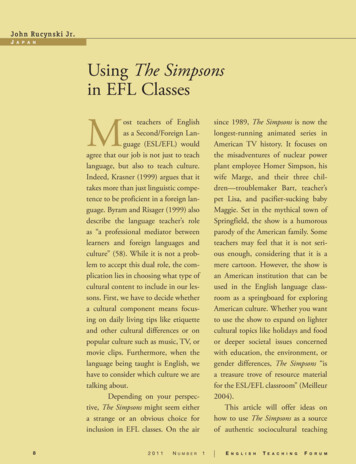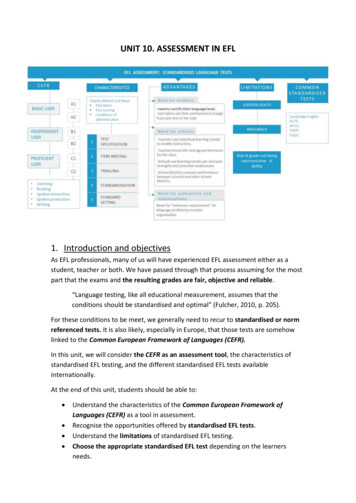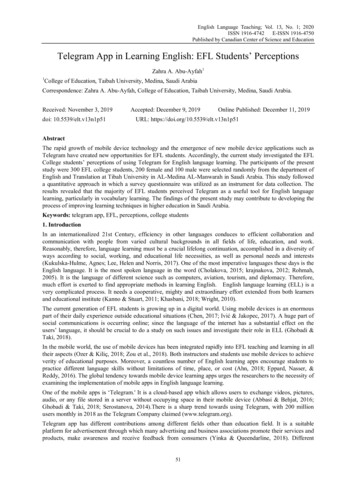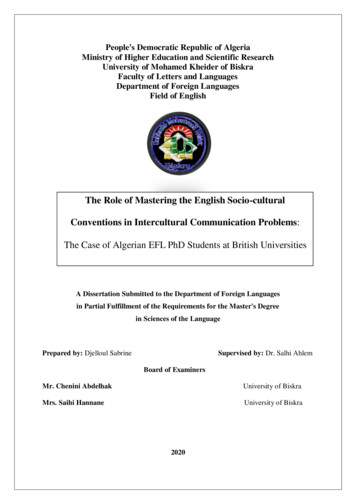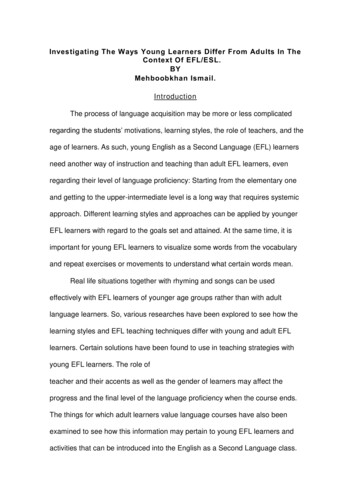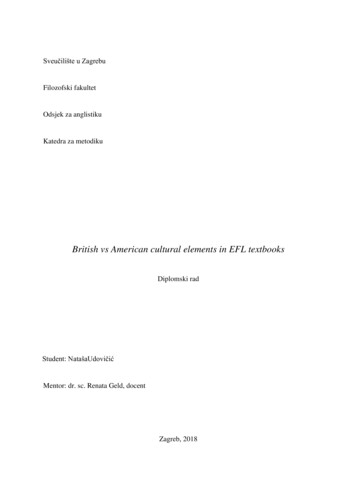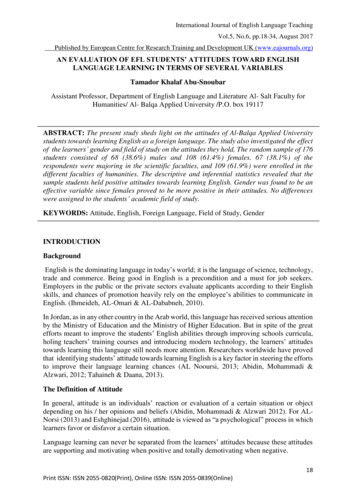
Transcription
International Journal of English Language TeachingVol.5, No.6, pp.18-34, August 2017Published by European Centre for Research Training and Development UK (www.eajournals.org)AN EVALUATION OF EFL STUDENTS’ ATTITUDES TOWARD ENGLISHLANGUAGE LEARNING IN TERMS OF SEVERAL VARIABLESTamador Khalaf Abu-SnoubarAssistant Professor, Department of English Language and Literature Al- Salt Faculty forHumanities/ Al- Balqa Applied University /P.O. box 19117ABSTRACT: The present study sheds light on the attitudes of Al-Balqa Applied Universitystudents towards learning English as a foreign language. The study also investigated the effectof the learners’ gender and field of study on the attitudes they hold. The random sample of 176students consisted of 68 (38.6%) males and 108 (61.4%) females. 67 (38.1%) of therespondents were majoring in the scientific faculties, and 109 (61.9%) were enrolled in thedifferent faculties of humanities. The descriptive and inferential statistics revealed that thesample students held positive attitudes towards learning English. Gender was found to be aneffective variable since females proved to be more positive in their attitudes. No differenceswere assigned to the students’ academic field of study.KEYWORDS: Attitude, English, Foreign Language, Field of Study, GenderINTRODUCTIONBackgroundEnglish is the dominating language in today’s world; it is the language of science, technology,trade and commerce. Being good in English is a precondition and a must for job seekers.Employers in the public or the private sectors evaluate applicants according to their Englishskills, and chances of promotion heavily rely on the employee’s abilities to communicate inEnglish. (Ihmeideh, AL-Omari & AL-Dababneh, 2010).In Jordan, as in any other country in the Arab world, this language has received serious attentionby the Ministry of Education and the Ministry of Higher Education. But in spite of the greatefforts meant to improve the students’ English abilities through improving schools curricula,holing teachers’ training courses and introducing modern technology, the learners’ attitudestowards learning this language still needs more attention. Researchers worldwide have provedthat identifying students’ attitude towards learning English is a key factor in steering the effortsto improve their language learning chances (AL Nooursi, 2013; Abidin, Mohammadi &Alzwari, 2012; Tahaineh & Daana, 2013).The Definition of AttitudeIn general, attitude is an individuals’ reaction or evaluation of a certain situation or objectdepending on his / her opinions and beliefs (Abidin, Mohammadi & Alzwari 2012). For ALNorsi (2013) and Eshghinejad (2016), attitude is viewed as “a psychological” process in whichlearners favor or disfavor a certain situation.Language learning can never be separated from the learners’ attitudes because these attitudesare supporting and motivating when positive and totally demotivating when negative.18Print ISSN: ISSN 2055-0820(Print), Online ISSN: ISSN 2055-0839(Online)
International Journal of English Language TeachingVol.5, No.6, pp.18-34, August 2017Published by European Centre for Research Training and Development UK (www.eajournals.org)Statement of the problemThe field of language attitude still needs more investigation since it can furnish the needed datafor curricula planners, teachers and instructors. An understanding of the students’ attitudeallows educators to gain a more realistic insight into what goes inside the learners’ heads, theirfears, sources of anxiety and preferences instead of relying on how we as teachers view thesepoints. This study is aimed to be a contribution to treat the deficit in our knowledge concerningthe area of the attitudes of English as a foreign language students towards learning English.Aim of the studyThe aim of this study is to explore the attitudes of EFL students at AL-Balqa Applied Universitytowards learning English. The present study also sheds light on how gender and academic fieldof study effect their attitudes.Significance of the studyIn spite of the plethora of research dealing with the field of students’ attitudes towards learningEnglish, the Arab world seems to suffer from a gap in the efforts in this area. Curricula plannersand educators still think that they know better and that they can make the best choices anddecisions depending on their own past experiences and conceptions.This study is meant to give support for the previous body of research in order to emphasize theidea that the educational process should be structured and designed to serve the students’ needsand preferences depending on their own attitudes and factors that may affect these attitudeslike gender and academic field of study.Study questions1. What are the attitudes of AL-Balqa Applied University EFL Students towards learningEnglish?2. Is there any statistically significant differences in AL-Balqa Applied University EFLStudents’ attitudes towards learning English due to gender?3. Is there any statistically significant differences in AL-Balqa Applied University EFLStudents’ attitudes towards learning English due to their academic field of study?LITERATURE REVIEWAttitude in generalResearchers believe that attitude forms a basic point in the process of language learning.Kiziltepe (2000) investigated the influence of attitudes and motivation on the learning ofEnglish by Turkish students. The research findings depicted that Turkish students have apositive attitude towards learning English and the British and American communities, they alsoreported no in-class anxiety.In an attempt to investigate the effect of EFL students’ attitude on their use of language learningstrategies (LLSs), Sadighi and Zarafshan (2006) conducted a study that analyzed the responsesof 126 freshmen and seniors majoring in teaching English and English translation. The19Print ISSN: ISSN 2055-0820(Print), Online ISSN: ISSN 2055-0839(Online)
International Journal of English Language TeachingVol.5, No.6, pp.18-34, August 2017Published by European Centre for Research Training and Development UK (www.eajournals.org)respondents proved that their attitudes affected their use of LLSs in a significant way. Toclarify things, learners who reported having positive attitudes towards users of the LLSs thanthose holding negative attitudes.AL-Tamimi and Shuib (2009) conducted a study to investigate the attitudes of PetroleumEngineering student’s motivation towards learning English. 81 students furnished the sampleof this study and completed a questionnaire prepared by the researchers. The analysis of theparticipants’ responses depicted that they had a positive attitudes towards learning English andthe culture of the English speaking world.In a research conducted by Malallah (2010) Kuwaiti University Students proved to havepositive attitudes towards learning English and towards the native speakers of English. Thestudy also proved the existence of a positive relationship between the respondents’ attitudesand their achievement and their practical needs of the English language.Shirbaji (2010) studied the attitudes of undergraduate students at Faculty of Humanitiestowards learning English as a foreign language. A large sample of 400 students (48.3% femaleand 51.7% males) completed a questionnaire developed by the researcher. The findings provedthat the participants have a positive attitude towards learning English.The attitude towards learning English as a foreign language among the pre-intermediate andintermediate Saudi students at The English Language Institute of King Abdulaziz Universitywas investigated by Alkaff (2013). 47 female students formed the sample of the study andcompleted a questionnaire developed by researcher. The results illustrated the sample studentshave positive attitudes towards learning English. The participants also reported a strongtendency towards improving their English proficiency in spite of the limited chances ofpracticing English in their EFL society.Al Noursi (2013) explored the attitudes of United Arab Emirates students towards learningEnglish as a foreign language. The 196 students at a technology high school were theparticipants in this study. They reported having a positive attitude towards learning English.An interesting finding was also reached concerning the teacher’s nativity which did not haveany effect on the respndents’ attitude towards EFL.The attitudes of the Jordanian students concerning learning English was explored by Tahainehand Dana (2013). The sample in this study consisted of 184 female students majoring in Englishlanguage and literature. The participants completed the Attitude / Motivation Test Battery. Thestudents proved to hold positive attitudes towards EFL as well as towards the English-Speakingpeople.In an important study by Al Samadani and Ibnian (2015), the effect of Saudi EFL Student’sattitudes towards learning English on their academic achievement was thoroughly studieddepending on a sample that consisted of 112 English major students who ranged from freshmento seniors with different grade point averages (GPA). The study findings demonstrated that thestudents in general have positive attitudes towards learning English. Students with high GPAsreported the highest positive attitudes towards learning English, followed by the medium GPAsstudents and the low GPAs students, respectively.Ahmad (2015) explored the attitudes of undergraduate Malaysian students towards learningEnglish. The 238 participants who completed a 30-item questionnaire depicted a positiveattitude towards EFL.20Print ISSN: ISSN 2055-0820(Print), Online ISSN: ISSN 2055-0839(Online)
International Journal of English Language TeachingVol.5, No.6, pp.18-34, August 2017Published by European Centre for Research Training and Development UK (www.eajournals.org)Attitude and GenderDurer and Sayar (2012) investigated the gender differences in the attitudes of 400 nun-Englishmajor students in Turkey. The findings proved that both males and females showed equallypositive attitudes towards learning English as a foreign language.Soleimani and Hanafi (2013) investigated the Iranian medical students’ attitudes towardsEnglish language learning. After completing a 30-item likert scale questionnaire, the 40 maleand female participants’ responses were analyzed. The findings highlighted that the studentshave a highly positive overall attitude towards English language learning. The t-test provedthat the male students positive attitude was higher than that of the females’.Eshghinejad (2016) probed the EFL students’ attitudes towards learning English-Language.The researcher also studied the existence of differences due to the participants’ gender. Thedata analysis proved that the participants hold overall positive attitudes towards Englishlanguage learning. Concerning the language attitude and the gender of the respondents, it wasfound that the females depicted a higher positive attitude than the males proving the existenceof a significant deference in the attitude towards learning English between the male and femaleparticipants.Attitude and Academic Field of StudyMing, Ling and Jaafar (2011) explored the attitudes of secondary school Malaysian studentslearning English in an attempt promote the process of language teaching. Through analysis ofsurvey questionnaire, the respondents proved to have an overall positive attitude towardslearning English. The science students showed more interest in improving their English thanthe Art students. It was also found that the students who were rated as highly proficient showedhigher positive attitude than the medium and lower proficiency students.Abidin, Mohammadi and Alzwary (2012) carried out a study to investigate Libyan students’EFL attitudes towards learning English language. The study also probed the existence ofsignificant differences in the students’ attitude due to their gender and field of study. The 180participants were majoring in the three fields of social sciences, life sciences and basic sciences.The participants’ depicted an overall negative attitude towards learning English. Gender provedto be effective here. The attitude of the females was slightly higher than the attitude held bythe males. The findings of study also proved to produce significant differences. By way ofclarification, the social sciences students proved to hold the highest positive attitude of all,followed by the students of basic sciences and life sciences respectively.METHODOLOGYParticipants176 low to high participants furnished the sample of this study. The sample consisted of 68males (38.6%) and 108 (61.4%) females. 67 (38.1%) participants were majoring in Scientificfaculties and 109 (61.9%) were students of the faculties of Humanities. The ages of the samplemembers range between 18-22 and they belong to different social classes.21Print ISSN: ISSN 2055-0820(Print), Online ISSN: ISSN 2055-0839(Online)
International Journal of English Language TeachingVol.5, No.6, pp.18-34, August 2017Published by European Centre for Research Training and Development UK (www.eajournals.org)DesignThis study is quantitative in nature and depends on a 55-item questionnaire as an instrument.InstrumentThe instrument employed in this study is a questionnaire adapted from gardener’s (1985)attitude and motivation test battery (AMTB). The specialists who checked the validity of thisquestionnaire recommended that it has to be translated to Arabic. The questionnaire items weretranslated by two M.A translation holders and after making certain modifications, the finalcopy was given back to the validity team to check that no problems exist between the Englishand Arabic versions of the instrument.Reliability of the Research InstrumentThe researcher used Cronbach Alpha to measure the reliability of the measuring tool afterconducting a pilot study. The value of Cronbach Alpha was (alpha 8204%) which isacceptable.ProcedureThe challenges at the Department of English and literature who were teaching the English 101and English 102 classes were kind enough to help the researcher in distributing the Arabicversion of the questionnaire on the randomly chosen five sections. The process took nearly 15minutes.Limitations of the studyThe study is limited to English 101 and English 102 students at AL-Balqa Applied University/ center Collages during the second semester of the academic year 2016-2017.Statistical analysisThe data were analyzed via SPSS (version 20). Both descriptive and inferential statistics wereemployed to gain answers for the questions of the current study.RESULTSQ1: What are the attitudes of AL-Balqa applied university EFL students towards learningEnglish?In order to answer the first research questions, descriptive statistics were used. The descriptivestatistics included mean and standard deviations of difference in Al-Balqa Applied UniversityEFL students’ attitudes towards learning English language. The arithmetic mean average scoreof the overall was (3.4432), standard deviation(1.0851), which is moderate to high. Accordingto Oxford and Burry- Stock (1995), usage scores averaging (3.5-5.0) are called as High, (2.53.4) are designated moderate strategy use; and scores ranging from (1.0-2.4) are often assignedas low, table (3) shows the (mean & standard deviation) .22Print ISSN: ISSN 2055-0820(Print), Online ISSN: ISSN 2055-0839(Online)
International Journal of English Language TeachingVol.5, No.6, pp.18-34, August 2017Published by European Centre for Research Training and Development UK (www.eajournals.org)Table (1): Means and Standard Deviation of Al-Balqa Applied University EFL students’attitudes towards learning English eviation1.12541.28731.14481-English is one of my favorite subjects2-I don’t like English lessons3-I like to master English because ithelps me get a good job in the future.4-Sutdying makers me have moreconfidence in expressing myself.5-I view people who know more thanone language as very knowledgeable.6-Studying English helps me improvemy personality.7-To tell the truth, I study English justto pass the exams.8-I don’t like to read instructions ofadvertisement in English9-Watching English programs is notenjoyable for me10-Being good in English helps mecommunicate in English effectively.11-Being good in English helps me usemodern technology effectively.12-I feel bored when I listen to otherswhile they speak English.13-I feel happy when I learn English.14-English is a very important part ofany educational program.15-I like listening to English.16-I want to learn as much English asI can.17-StudyingEnglish is importantbecause it will allow me to meet andestablish friendships with people fromdifferent cultures.18-I always try to postpone doing myEnglish homework.19-I would feel comfortable speakingEnglish outside the class.20-studying English makes me able tocreate new thoughts.21-learning English is not important.22-I enjoy me English class more thanany other class.23-I believe that English is difficultand complicated to 821.1788Moderate17623Print ISSN: ISSN 2055-0820(Print), Online ISSN: ISSN 2055-0839(Online)
International Journal of English Language TeachingVol.5, No.6, pp.18-34, August 2017Published by European Centre for Research Training and Development UK (www.eajournals.org)24-I like to master English to help meresume my education.25-I like to read stories and poems inEnglish.26-Studying English make me proud 3.77841.1523High17627-Learning English is not animportant goal in my life28-I like to learn English because ithelps me travel abroad.29-My aptitude towards learningEnglish is high.30-Studying English causes fear forme.31-Speaking English increase my selfconfidence.32-I can understand what others say inEnglish.33-I hate English34-I think that writing in English is noteasy.35-Studying English brings positiveemotions for me.36-Studying English is importantbecause it will allow me to be more atease with people who speak English.37-Studying English helps me to havegood relationships with my friends.38-I am interested in improving myEnglish.39-Frankly speaking, I really have littleinterest in learning English.40-I never take the feedback I receivein my English class seriously.41-I feel happy when I write notes andinstructions in English.42-I feel bored when listen to otherswhile they speak .1166High1762.73861.2783Moderate17643-I never ask my classmates orinstructors about the content of theEnglish classes that I miss.44-Learning Englishis a greatexperience.45-I like learning English because ithelps me know more about 4.1648.9327High17624Print ISSN: ISSN 2055-0820(Print), Online ISSN: ISSN 2055-0839(Online)
International Journal of English Language TeachingVol.5, No.6, pp.18-34, August 2017Published by European Centre for Research Training and Development UK (www.eajournals.org)46-I cannot make summariesinEnglish.47-I cannot take down notes in Englishwhile listening to a speech or a lecture.48-English is one of my favoritecourses.49-Studying English is importantbecause will be able to interact moreeasily with speakers of English .50-Being good in English will help medo better in the other subjects that Istudy.51-Studying English is importantbecause other people will respect memore if know English.52-I think that learning English is dull.53-Students who claim they getnervous in English classes are justmaking excuses.54-I haven’t got any great wish to learnmore than the basics of English.55-Studying English is importantbecause I will need it for my 1764.4716.8137High1763.44321.0851Moderate176Table (1): shows that the mean average for the answers about the " difference in Al-BalqaApplied University EFL students’ attitudes towards learning English language " (3.4432), was"moderate" and the standard deviation was (1.0851). As Shown in Table (3), there werepositive attitudes toward the above questions because their mean were greater than the meanof the scale (3), but in different percentage. The item which gained the highest mean aboutattitudes is number (10) "Being good in English helps me communicate in English effectively."The means reached (4.5000) and the standard deviation was (0.8751).This item with the lowestmeans (1.9773) was number (27) " learning English is not an important goal in my life."Q2: Are there any statistically significant differences in Al-Balqa Applied University EFLstudents’ attitudes towards English language learning due to gender?In order to answer this research question, the Independent Samples T-Test was employed todetermine differences between the attitudes held by the male and female participants. Table(2) shows the dependent Samples T-Test.25Print ISSN: ISSN 2055-0820(Print), Online ISSN: ISSN 2055-0839(Online)
International Journal of English Language TeachingVol.5, No.6, pp.18-34, August 2017Published by European Centre for Research Training and Development UK (www.eajournals.org)Table 2: Independent Samples T-Test for getowardsEnglishMale (N 68)Female (N 50.044Table (2) shows that there are significant statistical differences at (α 0.05) level in therespondents’ attitudes towards learning English language due to gender in favor of the female.Q3: Are there any a statistically significant differences in Al-Balqa Applied University EFLstudents’ attitudes towards learning English language due to their field of study?In order to answer the first research questions, descriptive statistics were used. The descriptivestatistics included mean and standard deviations of Al-Balqa Applied University EFL students’attitudes towards learning English language, the Independent Samples T-Test was utilized todetermine any differences in the students attitudes due to their field of study (faculties ofhumanities and the scientific faculties). Table (3) shows the the results obtained from thedependent Samples T-Test.Table 3: Independent Samples T-Test for identification (statistically significantdifference in Al-Balqa Applied University EFL students’ attitudes towards learningEnglish language due to their field of study)FieldSectionAttitudes towardslearning EnglishlanguageScientific Faculties(N 67)Mean3.4643S.D0.2642Humanities (N 109)Mean3.4010S.D0.3270TSig1.3390.066Table 3: shows that there are no significant statistical differences at (α 0.05) level in AlBalqa Applied University EFL students’ attitudes towards learning English language due totheir field of study.DISCUSSIONThe present study is an attempt to nourish the reservoir of a research dealing with the Englishas a foreign language Students’ attitudes towards learning English worldwide and in the Arabworld in particular. It also takes into the role the learners’ gender and field of study play in thisrespect.26Print ISSN: ISSN 2055-0820(Print), Online ISSN: ISSN 2055-0839(Online)
International Journal of English Language TeachingVol.5, No.6, pp.18-34, August 2017Published by European Centre for Research Training and Development UK (www.eajournals.org)Concerning the first question “What are the attitudes of AL-Balqa applied university EFLstudents towards learning English?”, the result of descriptive analysis revealed that the 176participants’ overall attitude is highly positive (M 3.4432, S.D 1.0851). This result is consistwith a good number of results illustrated in the wide range of studies tackling this question likeAl Noursi (2013), Tahaineh and Dana (2013), Chalak and Kassaian (2010), Ahmed (2015) andmalallah (2010), whose participants proved to hold highly positive attitudes towards learningEnglish language. The finding of the current study echoes and supports studies by AL-Tamimiand Shuib (2009) which proved the positive attitude of petroleum Engineering undergraduatesin Yemen, and Shirbagi (2010) whose participants depicted a favourable attitude towardslearning English as a foreign language.The current study however, is not consistent with a limited number of students in which theparticipants revealed having negative attitudes towards learning English language.The study conducted by Abdin, Mohammadi and Alzwari (2012) revealed that the Libyanlearners hold negative attitudes towards learning English.AL-Zahrani (2008) found that his Saudi participants depicted a negative attitude towardslearning English as a foreign language. The researcher justified this attitude as being a resultof the inappropriate practices and techniques employed by some teachers and instructors.A closer study of table (1) in the current study shows that the respondents showed low tomoderate attitudes towards the negative items in the questionnaire (2, 7, 8, 9, 12, 18, 21, 27,33, 40, 43, 46, 53). For example, the participants depicted a low attitude towards “I don’t likeEnglish lessons”, “learning English is not important”, “learning English is not an importantgoal in my life”, and “I haven’t got any great wish to learn more than the basics of English”.They also responded moderately to the items like “Frankly speaking. I really have little interestin learning English”. “I hate English”, “I always try to postpone doing my English homework”,and “to tell the truth, I study English just to pass the exams”. A good indicator is revealedwhen we see that “Studying English causes fear for me” is ranked moderately (m 3.1364,S.D 1.2755). This means that teachers can still play an important role in improving thelearners’ attitude towards English by eliminating the sources of anxiety in their classes.Another important finding revealed in this study is that the participants depicted more positiveattitudes towards the productive skills (speaking and writing). Their response was highconcerning “I would feel comfortable speaking English outside the class” (M 3.8580,S.D 1.1500) and “Speaking English increases my self-confidence” (M 3.6023, S.D 1.0314).Their attitudes towards the writing skill was reported to be moderate to high. “I think thatwriting in English is not easy” (M 2.8182, S.D 1.4465) and “I cannot make summaries or takedown notes in English” (M 2.6534, S.D 1.3435) were moderately ranked, while “I feel happywhen I write notes and instructions in English” (M 3.8182, S.D 1.1166) was ranked high. Theitems dealing with the input skills (reading and listening) were ranked as low to moderate. “Idon’t like to read instructions or advertisements in English” (M 2.7330, S.D 1.1224) and “Ilike to read stories and poems in English” (M 3.2273, S.D 1.0821) were all moderatelyranked. The learners attitudes concerning the items related to the listening skill were reportedto be low to moderate “I feel bored when I listen to others while they speak English” wasranked as moderate (M 2.7045, S.D 1.2436) and “I like to listen to English” (M 2.4205,S.D 1.2256) was low.27Print ISSN: ISSN 2055-0820(Print), Online ISSN: ISSN 2055-0839(Online)
International Journal of English Language TeachingVol.5, No.6, pp.18-34, August 2017Published by European Centre for Research Training and Development UK (www.eajournals.org)The participants proved to be aware of the importance of mastering English in our modernworld. Items related to the importance of English for their education, using technology and forcareers are ranked high. “I like to master English because it helps me get a good job in thefuture” (M 3.93034, S.D 1.1448), “Being good in English helps me communicate in Englisheffectively” (M 3.930340, S.D 0.8751), “English is a very important part of any educationalprogram” (M 4.3182, S.D 0.8356) are just a few examples of these high rankings. Studentsalso depicted an awareness of the fact that English can improve their personalities. “StudyingEnglish makes me more confidence in expressing myself” (M 4.09, S.D 0.9275), “StudyingEnglish makes me proud of myself” (M 3.7784, S.D 1.1523) and “Studying English bringspositive emotions for me” (M 3.8352, S.D 0.9509) were ranked high. These rankings are thebest explanation of the high positive attitude reported by the participants in the current study.English is being positively received because of reasons related to finding better chances ofeducation and careers as well as enhancing their self-esteem and self-image.Concerning the second question in the study “Is there any statistically significant differencesin Al Balqa Applied University EFL students’ attitudes towards learning English due togender?”, the independent samples T-Test was used. It proved the existence of significantstatistical differences at (α 0.05) in the students’ attitudes due to gender in favor of the femalesas illustrated in table (2). This result is in line with Abidin, Mohammadi and Alzwari (2012).The mean score of the language attitude as reported by the female students was 2.7599 and thestandard deviation was 0.54763. The male participants, on the other hand, had a mean of 2.4856and a standard deviation that mounted to 0.6.298. To clarify things,
English is the dominating language in today's world; it is the language of science, technology, trade and commerce. Being good in English is a precondition and a must for job seekers. Employers in the public or the private sectors evaluate applicants according to their English skills, and chances of promotion heavily rely on the employee's abilities to communicate in English. (Ihmeideh, AL .

